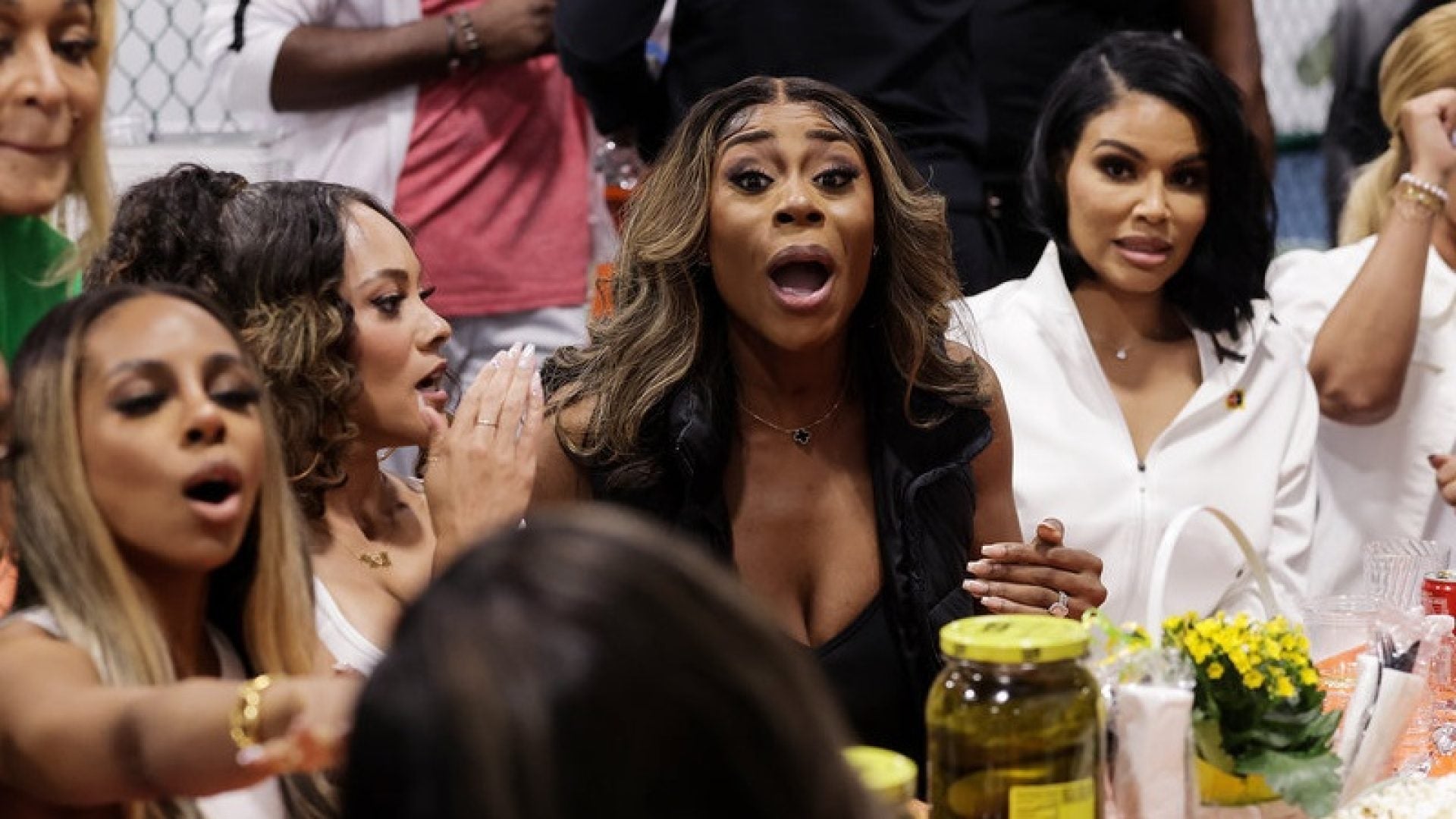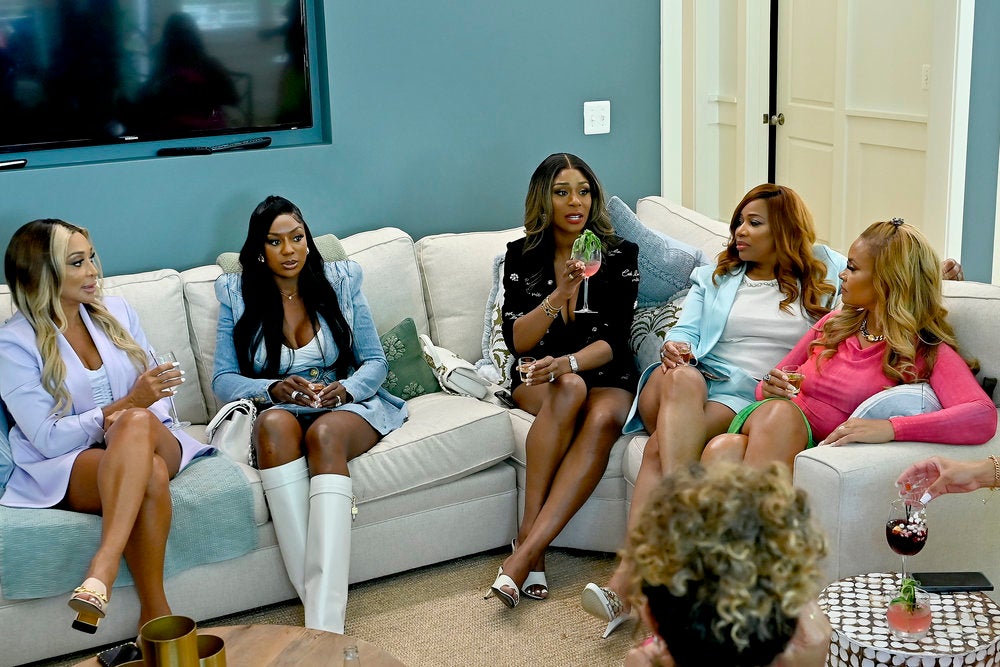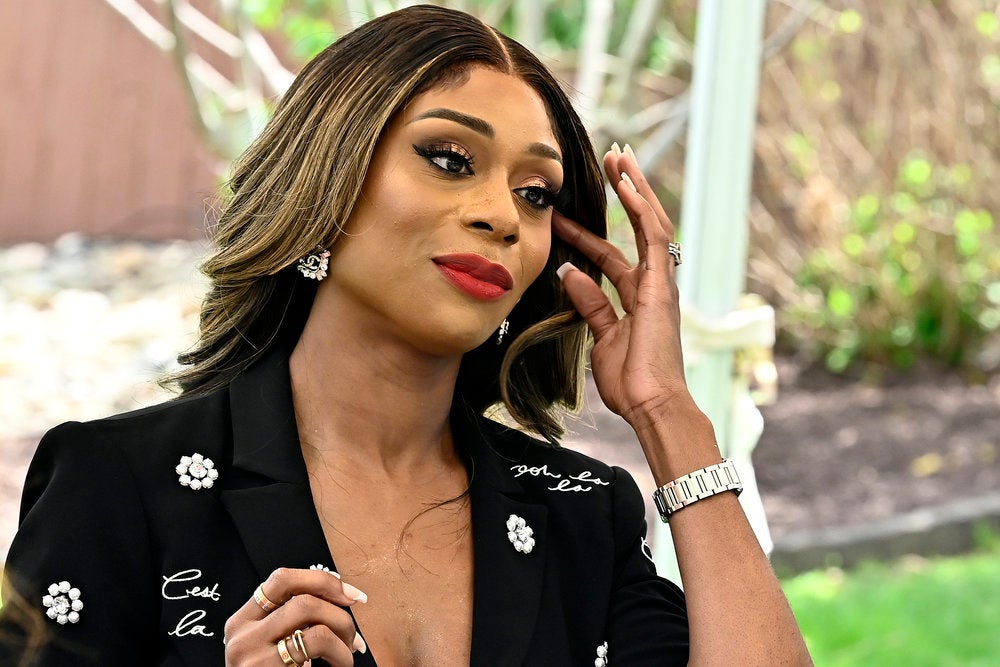
Among all the “Real Housewives” franchises, Potomac gained its claim to fame through its two matriarchal anchors, Karen Huger and Gizelle Bryant. While, like many of its counterparts, Potomac is recognized for depicting the lifestyles and interpersonal dynamics of women, RHOP has become somewhat lackluster in offering a compelling glimpse into the lives of the ladies of Potomac, Maryland. However, beneath the surface lies a deeper issue.
Now in its eighth season, the show has mostly stayed with the same cast, with a scattering of replacements and additions, with Monique Samuels joining in season two, Candiace Dillard-Bassett who joined in season 3, Dr. Wendy Osefo in season 5, and Mia Thornton in season 6. Outside of some of the newly minted friends and housewives, the show’s anchors have mostly remained the same – Huger, Bryant, Robyn Dixon, Charisse Jackson-Jordan (now a friend-of the show) Ashley Darby, and Katie Rost, who was fired after season 1 and brought back for season 4.

The franchise has been on a sharp decline for some time now, mostly due to the uninspiring storylines of most of its cast. Coupled with the pervasive hazing, combined with an undercurrent of colorism and blatant unfairness has made the show increasingly harder to watch. Potomac has a history of using a bait-and-switch tactic, deliberately provoking and isolating women within the group, only to subsequently label these women as “aggressive.” It first reared its head in season 5 when the “green-eyed bandits,” Bryant and Dixon led a crusade against Samuels, who physically attacked Dillard-Bassett and drummed up rumors about Samuels’ and her family. Though Samuels left the show following season five, her resounding words have seemed to foreshadow the direction of the franchise’s future.
Following Thorton’s assault on Osefo in season 7, where Mia splashed a martini in Wendy’s face, Samuels came forward with commentary about her former castmates. “One thing Wendy should understand is that it’s not about her actions or lack thereof. She could have sat there quietly and they still would have found reason to ice her out. The same ladies who told me words or even antagonizing someone is not grounds for getting physical are defending a person who got physical over Peter Thomas? LOL!!! Just wow.”
The glaring issue on Potomac is seemingly that the goalpost always moves depending on who you’re talking to. During season 5, the women largely condemned Monique for attacking Candiace. During the Season 7 reunion, when the altercation between Wendy and Mia was addressed, it was radio silence among the women, with the exception of Ashley, Karen, and Candiace. This consensus was largely attributed to the evident animosity towards Wendy – Bryant openly stated “I don’t like her,” in reference to Wendy. The ousting has become a pattern, and it’s orchestrated by the GEB, who have maneuvered through much of the show’s past seasons without having to reveal much in their own personal lives, and pivoting the focus on the other women and stirring up drama.
These attacks appear to be grounded in projection. Women who enjoy the support of loving husbands, successful careers, and supportive families seem to evoke envy from those who do not have those same privileges. Let’s face the facts: Gizelle is a divorcée from a high-profile ex-pastor, Jamal Bryant; Robyn is grappling with both financial and marital challenges with her now-remarried husband, Juan Dixon; Ashley is navigating a purported divorce; and Mia, in recent news, has been seen with a new man (not her husband, G). It seems like a calculated strategy to marginalize women who exude positivity and possess the qualities others covet. For those who may harbor entitlement due to being fairer skinned, witnessing darker-skinned Black women thriving in every aspect of life can be triggering.

Nevertheless, in an apparent response to the accusations of colorism and everyone choosing sides after Thorton assaulted Wendy, the producers of Potomac made a seemingly concerted effort to introduce a new cast member, Nneka Ihim, who shares Nigerian heritage with Osefo. Although the inclusion of Ihim might be seen as a positive step towards representation of darker-skinned Black women on screen, the on-screen conflict between Ihim and Osefo highlights a more profound cultural problem. “One of the major problems that they’re having is that they make their ethnicity a big part of their personality. There’s nothing wrong with wanting to demonstrate your culture,” says Content Creator and fellow Nigerian Renny Vonne. “One of the mistakes they’re making is that they’re making that the central part of their personality. They keep attributing their successes and wealth to being Nigerian, which is where the problem lies.”
The ongoing exchange between the two has involved accusations against Wendy’s family, labeling them as “Osu,” a term highly considered derogatory in Nigerian culture. In a Ted Talk, Speaker Ogechukwu Maduagwu describes Osu as people who “were told and believed, dedicated their lives and their services to the community deity and went further to pledge the faithfulness of their generations unborn, therefore they belong to the communities.” Labeling someone as “Osu” carries with it institutionalized discrimination and isn’t something to be taken lightly in Nigerian culture.
Furthermore, the dispute includes implications of witchcraft, shrines – most of which are perpetuating ignorance, xenophobia and fear mongering. “We have two women who are not only from Nigeria, and they’re actually the same ethnicity, and then happen to be experiencing conflict as a result of cultural differences within their ethnicity, which in other words, they’re now airing [dirty] laundry, that had no business being aired all the way in America,” she says.
Apart from Wendy and Nneka, the women in the group have no knowledge of traditional African religion. Breaking the fourth wall reveals a more significant concern—a storyline tactically orchestrating a conflict between two Igbo women on national television. Reality television thrives on conflict, but the narrative falters when we clumsily attempt to delve into Nigerian spirituality on a national stage. It calls the showrunners to the carpet for allowing the conversation to happen on camera. It’s something very devious about the nature of exposing sensitive cultural discussions without the necessary care and responsibility, it intentionally perpetuates stereotypes and causes harm. “The implication that Wendy is Osu is one thing. Secondly, when Nneka accuses Wendy’s mom of practicing witchcraft, these are accusations and conflicts that take place in the privacy of the home within Nigeria in Igbo culture,” Vonne continues. “You are on American television, you’ve now taken the responsibility of trying to represent Nigeria, when nobody asked you. It’s a heavy burden to carry quite frankly.”
To bring osu claims to television among a group of women who hardly get along in the first place, (most of whom don’t like Osefo) adds an extra layer of insensitivity. It not only magnifies existing conflicts but also exploits cultural intricacies for dramatic effect. Vonne, who is currently in Nigeria for the holidays, says, “It’s strange for people to tune into American television and see that [this] is a plot.”
Among the storylines presented over the show’s eight seasons, none have generated as much controversy and drama as the recent feud between Osefo and Ihim. What’s even more perplexing is the missed opportunity to explore other noteworthy topics that could be peppered into the show – Nneka’s family life, or even Wendy’s new talk show. Both Osefo, a doctor of philosophy, and Ihim, a lawyer, had the potential to showcase their affluent and opulent lifestyles or joining forces, particularly as Igbo women. Unfortunately, this discourse has become the show’s central storyline, overshadowing the opportunity to highlight their achievements.
The insinuations surrounding Wendy’s family lack tact, and discussing them on national television lacks the discretion that the Nigerian community deserves. This cultural debate – if you can even call it that – necessitates a conversation that is both delicate and nuanced. The socioeconomic and political implications of such a claim are not suited for a platform like Real Housewives. “They’re in such an awkward fight, because they’re having a fight where you’re throwing heavy accusations that are considered taboo within the culture. If you accuse someone of witchcraft, that is a really big deal,” Vonne explains. “People freak out, it’s not something to be taken lightly, and people are very insulted by it. Nigeria is a very religious country. Both [women] are Catholic/Christian, to accuse someone of witchcraft, is like dang, you hate them. It calls into question how in tune with the culture they both are. For that to be the storyline for a show about lighthearted drama, where they normally argue about having four homes, or your living room doesn’t look good, or who got botox. Then to speak about witchcraft and being from a caste system, that is just irresponsible and they should know better.”
Unfortunately, this is not the first instance; during the Season 7 reunion, when Dillard-Bassett addressed colorism, none of the cast members were adequately equipped to engage in the conversation. However for such a conversation to land on a platform like Housewives speaks to a larger issue with the cast and production. Before Samuels was ousted in season 6, she brought forth claims of the women conspiring to come after her and fabricate storylines, and what’s happening to Osefo feels vaguely similar. “I told her at the season 5 reunion that she and her family would be next,” Samuels said in a post. “The hate with some of those women is not for the camera. They’re real life miserable.”
Real Housewives Of Potomac has shed light on the pitfalls of exploiting sensitive cultural topics for entertainment. The recklessness with which these claims have been brought to the forefront among a group of women already struggling to find common ground raises questions about the responsibility of showrunners and its ethics. Of how to move forward, Vonne says, “I think there needs to be admission that it went too far. I think they can’t address this how they talk about regular beef. It can’t be a discussion of, is Juan talking to the laundromat girl or, does Karen have an extra boyfriend, because that’s too light,” Vonne says. “They have to understand that by this storyline, we’ve actually insulted a whole culture. They need to admit and address as a unit that people with ethnic nuances never should have been a focus point for the season. It was a complete mistake to go down that road.”
As viewers, it prompts us to reflect on the boundaries between entertainment and cultural sensitivity, urging a more thoughtful approach to storytelling that respects the dignity and nuances of diverse backgrounds. The unresolved tensions and lingering controversies on the show serve as a stark reminder that, beyond reality television, real lives and cultures are at stake, demanding a more conscientious approach to what we choose to amplify.